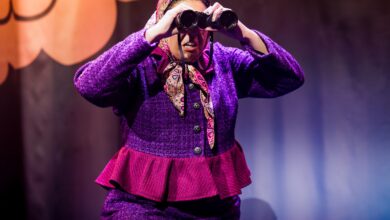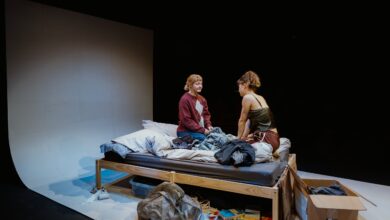Review: Jupiter’s Ghost, Cockpit Theatre
A thought-provoking exploration of humanity's essence, blending sci-fi concepts with powerful performances and innovative dance elementssummary
Rating
Excellent
Ever wonder what it would be like to witness the birth of humanity 2.0? As I left Cockpit Theatre after watching Jupiter’s Ghost my mind was buzzing with questions about the essence of being human. This ambitious production, directed by Tani Gill, takes us on a journey that’s part sci-fi thriller, part philosophical exploration, and part dance spectacle. While it may not reach the dizzying heights of Philip K. Dick’s mind-bending narratives, it certainly leaves you pondering the boundaries between thought, body, and what it truly means to be alive.
The story follows Dr. Elias Crete, a scientist racing against time to save his son Jove through human cloning. His obsession raises fascinating questions about the nature of humanity – are we defined by our thoughts, our bodies, or both? Conor Pavitt as Dr. Crete delivers a powerful performance, convincingly embodying the desperation and single-minded focus of a father willing to push ethical boundaries for love. His portrayal is nuanced, allowing us to sympathize with his motivations even as we question his methods.
Jupiter, the human clone central to the plot, is brought to life by Olivia J Night through an impressive display of physical theatre. The actor’s precise movements and otherworldly presence effectively convey her uncanny nature – more alien than the other characters, even if she is allegedly the only real human, adding depth to the production’s exploration of consciousness and identity.
One of the most harrowing aspects of the play is Jove’s character. Jack Chambers gut-wrenching outbursts and pained cries are so convincing that I found myself genuinely concerned for their well-being. This visceral performance adds a layer of emotional weight to the ethical dilemmas at the heart of the story.
While some plot twists are a little predictable, the delightfully ambiguous ending left me pondering long after the curtain fell. The production doesn’t offer easy answers, instead inviting the audience to grapple with the implications of Dr. Crete’s work and the nature of humanity itself.
Despite a minimalist set, considering the ambitious setting, the creative use of lighting and sound effects bring the futuristic world to life. You can almost see the life simulation chamber as bird songs fill the air, a testament to Milan Medvec’s sound designer skill in creating an immersive atmosphere. Derek Penny’s lighting design cleverly delineates between the stark reality of the lab and the more fluid, dreamlike states of the simulations.
The integration of dance sequences is surprisingly effective, adding dreamlike or nightmarish qualities to key scenes. These moments of physical expression serve to underscore the emotional beats of the story, from Jupiter’s grace to Jove’s struggles. And while perhaps it could be better integrated, in the end, the only complaint about the dance is that there isn’t more of it.
As the lights come up and reality slowly seeps back in, I find myself craving more of the world Jupiter’s Ghost has created. This production is an example of the power of innovative storytelling and the magic that can happen when different art forms collide. With its thought-provoking premise, evocative soundscape, and surprisingly effective dance elements, it proves that great theatre can transport us to new worlds even without a blockbuster budget. While there’s room for growth – a bigger production could truly make this show soar – Jupiter’s Ghost is a shining example of the kind of bold, speculative theatre we need more of. It’s a show that doesn’t just entertain, but challenges and inspires, leaving you with a renewed appreciation for the complexity of human existence.
Written and Directed by: Tani Gill
Produced by: Jamie Rycroft
Costumes by: Nabil Ali and Marta San Giovanni
Lighting design by: Derek Penny
Sound design by: Milan Medvec
Set design by: Tom T-Roberts
Jupiter’s Ghost has finished its run at Cockpit Theatre.
Further information about Tani Gill Dance Company can be found here.






